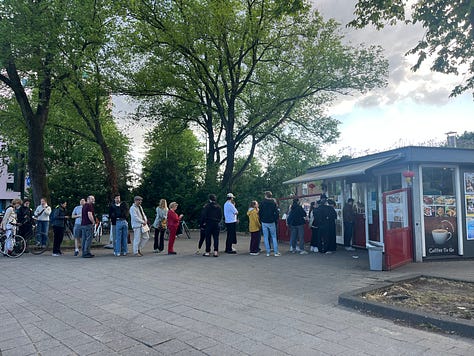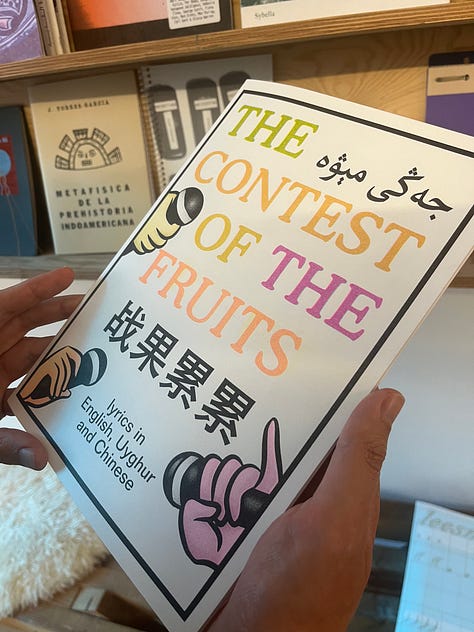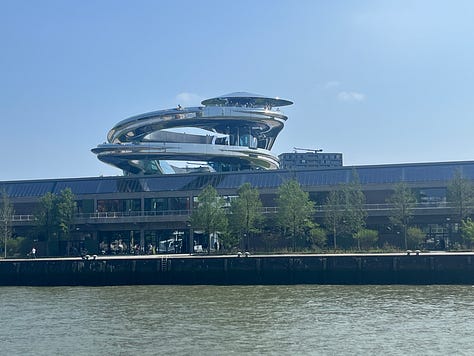Welcome to the 6th edition of Suipian, my personal newsletter in which I share thoughts and resources that help me make sense of Chinese society and its relationship to the rest of the world. You’re receiving this because you were previously subscribed to Changpian, my earlier newsletter sharing Chinese nonfiction writing – or if you recently subscribed. See here for more introduction to Suipian.
Suipian is coming to you from Rotterdam on this 端午节. I have spent the last few months mostly here for personal reasons, but China never feels far. Whether it is the ever-expanding range of authentic Chinese food offerings, the number of high-quality events, or the first European museum designed by a Chinese architecture firm that recently opened in my neighborhood (see this video and pictures below), these cultural trends feel energetic and like they have their own momentum apart from the political cycle, at least for now.
The below selection is as random as ever – hope there’s something you enjoy.
随笔 // Suibi // Notes
Sharing thoughts or resources related to my work as a correspondent
Like many, I am struggling to keep up with political developments, let alone my emotions around them. So I was touched when, on podcast 不合时宜, I heard Chinese semiconductor industry strategist Lu Ming discuss how every day he has to remind himself of what has changed: “我们已经处于一个不短的历史趋势的可能是头部,然后它在一时半会是结束不了的,抱着一种侥幸心理去期待世界不是这样子不会有任何的帮助,” he says, adding that: “这是我经常,每天,都跟自己在说的一件事情.”
Lu Ming, who built his career between the US and China and readily admits the subject is emotional to him, puts words to how, years into these events, people are affected by them on a daily basis. At this point, US-China decoupling in many areas does indeed feel locked in, and for industry players that means they plan accordingly, thereby further shaping the separation of markets or supply chains (“这跟你喜不喜欢它,赞不赞同它没有任何关系”).
At the same time, the last months show how many variables there still are within that scenario. Not having been able to report on it myself, I have appreciated stories on the impact of the announced tariffs on those working in the export sector, such as this earlier round-up with 20 trade professionals by 晚点LatePost, an update on the post-negotiations logistics rush by 凤凰, or this popular, fun story by 正面链接 reporter 蒋一凡 on 王大哥 from 胶州,who made money manufacturing Trump hats but has now soured on the US president.
I have been struck by a focus in what I am reading on how people should be protected from the economic fallout, from calls to respect the role of “无数企业主” in China’s development (“在这样的环境变化下,这些辛苦奋斗一生的人应当获得支持,有生存空间”) to the question of what happens if Chinese companies cannot keep adapting. Together with the growing urgency of measures supporting Chinese consumers – as one viral (and deleted) piece put it in April, in this trade war, “please give the bullets [as in the state support] to the people” – it is clear that in China this discussion is being held in the context of several years of economic downturn, and that simple appeals to optimism or nationalism do not fit the mood.
It's hard to say where things will stand in a few months. Given the depressing news on student visas, the cases of Chinese students suing US authorities are worth following, as is this U.S. politics account and the 美轮美奂 podcast. And researcher 吕晓宇 muses on a “没有美国的世界” by way of Iran.
Finally, perhaps drawing on my own remaining 侥幸心理, it does seem to me that no single narrative can capture the complexity of our current intertwinedness. Whatever happens next, our age of “逆全球化或者全球化大幅度的降低” will also still be very global.



点赞 // Dianzan // Likes
Recommendations in and out of the news-cycle
This 8-part podcast on the story of 故事FM founder Kou Aizhe’s Japanese midwife, who moved to 东北 in 1940 and left in the early ‘90s, is impressive and moving (here on Youtube but also on any podcast app).
Literary translator He Yujia writes a funny, thoughtful essay on the future of her profession and what AI can and cannot take away from her. “从前找我翻译的人改用AI,也阻止不了我看到一段精彩的文字,想要把它转化成另一种语言的渴望,当成练习,作为消遣,也是人生一大乐事.” On Wechat account 天使望故乡 (worth a follow).
In the opening piece of the Made in China special issue on Chinese journalism, communications scholar Fang Kecheng points to the “continuing vibrancy of Chinese journalism” that can especially be seen in the work of individual news creators working in different mediums, both in China and in the diaspora. While it remains shocking to take stock of how much worse the professional media environment is these days (although journalists keep at it), I agree and was reminded of a line by 单读 editor 吴琦 in one of their recent publications titled “有的没的”: “也许,我们要在今天的种种艰难中走下去,借助的并不是系统化的理论或者明确的话语,而就是一些“有的没的”… 看到自己喜欢的东西被允许存在,是一种尊严.”
“Women我们” writes about the verdict of Yashar Shohret, who was faced with more state scrutiny following his participation in the White Paper protests in Chengdu and was recently sentenced for his Uyghur songwriting. See also their earlier feature on the 26-year-old 业余 musician.
“两个女生一起成家、生娃、育儿.” In this essay for 三明治,author 阿川 writes in clear and lively prose about how she and her partner L gradually and purposefully shaped their family.
Also about two women, this 三联 story on“两位女性相差60岁的友谊” in which reporter 刘姝颖 gets close to 阿转, a Guangdong elderly woman who stayed single all her life as part of the 自梳女 tradition.
On 交错带, a new account dedicated to “东南亚的边境宇宙”, see this translation of a 缅语日记 by a labor migrant from Myanmar who worked in China since 2016. The diary, found in a border town apartment, paints a detailed picture of life as an undocumented migrant in China, with the author passing as a non-Mandarin speaking Yunnanese minority when needed and frequently getting discriminated, and ends with reflections on the growing pressure to return to Myanmar to join the army.
See also the reporting by 南方人物周刊 journalist 杨楠 on the Myanmar earthquake, which , she writes “对于一个受贫穷和战火困扰的国家来说, 这场地震激化了许多长期存在.. 的问题。地震就像一把盐,撒在了一个本就冒血的伤口上面.” In a podcast interview with writer Liu Min (with great show notes), Yang Nan discusses her disaster reporting, explaining why the events in Myanmar feel close to many Chinese – and indeed seem to be followed there more closely than in many other places – but how, for any destination, when you see the person in front of you “你还会觉得他跟你有关联”.
From 经济观察报, two down-to-earth features on 1) the rapid growth of Beijing suburb Yanjiao (“目前燕郊人口达110万,比2023年增加近20万”), and 2) the structural issues around parking in Chinese urban neighborhoods.
An essay by journalist Chen Wanqing on the classic subject of a 绿皮车 train ride, during which she sits so close to people that it makes no sense not to talk and thinks about her recently deceased grandfather (“我想象,他不沉默的时候是什么样子?”)
Useful new study on the strengthening role of China’s judiciary, also in standing up to local governments or police – as long as the cases do not involve citizens’ political rights.
A story and a popular book (with a nice cover) on the growing climbing scene in China.
Vincent Chang writes about his trip visiting tombs of the thousands Chinese workers who died supporting World War I and were buried in cemeteries in Belgium and northern France
This first issue of Cold Window, a new newsletter by translator Andrew Rule introducing Chinese fiction, made me sign up.
Sad that several great Beijing venues, who I was so glad to see had survived the lockdown years, are now closing. fRUITYSPACE, the music venue by the art museum, cites “合约到期+经济下行+精力有限” as reasons, and in general the economy seems to be a key culprit for the ‘why now’ (also for Dada and 凹凸). See their closing notice for a contemplative screenshot.
That’s it for now. Thanks for reading :)




Thank you so much for sharing all these insights!
I missed your writing in the nrc, I hope all is well , thank you